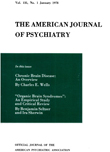BRAIN TUMORS IN MENTAL HOSPITAL PATIENTS
Abstract
In a review of 22 cases with brain tumors verified at operation or post-mortem examination at the Boston Psychopathic Hospital during the years 1938-1946, the following observations were made:
1. Glial tumors comprised the majority of cases although there were also meningiomas, craniopharyngiomas, pinealoma, and metastatic tumors. There were no pituitary or posterior fossa neoplasms in the series.
2. In the majority of patients, symptoms which in retrospect gave evidence of the growth of a brain tumor had been present for a period of 6 months or longer prior to admission.
3. In none of the 22 cases was there any history of previous mental illness.
4. The most prominent early manifestations of brain tumor in this series consisted of seizures, depression, and visual impairment.
5. At the time of admission to the hospital most patients showed prominent mental features characteristic of organic brain disease, and some showed clinical pictures resembling those seen in the toxic psychoses. The chief features of the mental status at the time of admission were confusion, memory impairment, and depression. In some cases, due to the prominence of depression, the clinical picture was similar to that often seen in the involutional psychoses.
6. Neurological abnormalities were present in all but 3 cases in which the tumors were confined to the region of the frontal lobes. In one case of olfactory groove meningioma the only positive neurological finding was anosmia.
7. Electroencephalography was of considerable value in preoperative diagnosis and localization of the tumors.
Access content
To read the fulltext, please use one of the options below to sign in or purchase access.- Personal login
- Institutional Login
- Sign in via OpenAthens
- Register for access
-
Please login/register if you wish to pair your device and check access availability.
Not a subscriber?
PsychiatryOnline subscription options offer access to the DSM-5 library, books, journals, CME, and patient resources. This all-in-one virtual library provides psychiatrists and mental health professionals with key resources for diagnosis, treatment, research, and professional development.
Need more help? PsychiatryOnline Customer Service may be reached by emailing [email protected] or by calling 800-368-5777 (in the U.S.) or 703-907-7322 (outside the U.S.).



